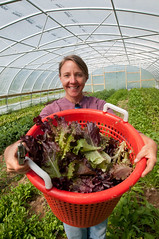Are you scared of what chemicals lurk in commercial fertilizer or pesticides? No longer worrying about these toxic chemicals is just one of the many benefits of gardening organically. Organic gardening is also cheap and requires very little equipment. Here are some fundamental tips to get you well on your way to being a successful organic gardener.
Have your tools for gardening nearby in order to maximize your efficiency with gardening. Carry your tools in a bucket, or keep them in the pockets of a pair of rugged pants. Keep your gloves, pruning shears, a hand spade and your other tools handy to quickly and easily do your garden maintenance.
When you are planning on growing a garden, you should think about the space you will need to provide a healthy growing area for your plants. Plants take up quite a bit of space as they grow, and it’s easy to underestimate just how much. Plants need room for physical growth and for the air to circulate within the soil. Plan accordingly and put an appropriate amount of distance between seeds.
In your flower beds and garden, utilize a few inches of organic mulch. This practice is an easy way to discourage weeds, retain moisture, and add valuable nutrients to your garden. It will also make your flower beds look more finished.
Plant some organic garlic. Garlic cloves may be planted in soil with good drainage in either the spring or fall. Put them an inch or two down into the soil with the pointed end up placed about four inches apart. You can cut the sprouts as they grow and use them to replace scallions and chives. When the top turns brown, it is time to harvest the bulbs. Harden the skin by setting the bulb in the sun, it usually takes several days. The garlic should be stored out of direct sunlight in a cool, dry place.
Grow crops that are expensive to buy. Of course, a particular plant’s value will be subjective. By choosing plants that tend to be more expensive, growing your own versions will save you a great deal of money over time. So start planting and enjoying those savings.
When you plant your garden, do so by creating biodiversity. The different types of plants will draw a variety of wildlife to your garden. Adding a variety of plants to your garden will mimic the look of a natural environment. By doing this, your garden will have a nice appeal to it, and you can relax knowing you’ve done something good for the earth.
Don’t let the chores for your organic garden pile up. Even if you can’t tend to your garden daily, you can do little things to help so that there is not a huge amount of work to be done when you are ready to get back to it. For instance, pluck weeds while you take your dog outside or before getting in your car.
Healthy soil results in healthy plants capable of standing up to diseases and insects. You won’t be killing off large amounts of insects, but good practices can help avoid the damage they can cause.
Construct raised flower beds of brick, stone, or wood. If you choose to use wood, make sure it is naturally rot resistant and untreated. Some great choices to choose from are cedar, locust and cypress. Take care to avoid wood that has been chemically treated when your garden will hold vegetables, since unknown substances in the wood can make their way into your future food. If you are already using treated lumber, you can use plastic liners, or a different barrier, in order to protect your garden.
Use coffee grounds on your soil. Coffee beans are loaded with nitrogen, which offers nourishment for plants. Nitrogen is generally a way to make your plants grow bigger, better and faster.
As you prepare veggies for cooking, cut up the scraps into small pieces and put them in a compost bin to be added to your garden later on. As the chopped up vegetables compost, they will give your soil good nourishment. You can also use those trimmings in your compost heap, but this method is much quicker.
Companion plants will help reduce your gardening chores. Planting bean vines at the base of corn, for example, provides a natural structure for the bean vine to grown on. These plants have many effects, from stopping pests to enriching the soil. Using these plants effectively means fewer chemicals are required to accomplish these goals. Plant herbs near vegetables, and the strong odor of the herbs will keep pests from the vegetable plants.
It is important to keep the temperature set between 65 and 75 degrees, if you wish to raise plants in the home. They need this type of warm temperature in order to grow. If you think it would not be comfortable to keep your residence that warm in the winter, consider purchasing a heat lamp to use on the plants.
By following some of the tips we include in this article, you’ll be up and running in no time and will soon have a good supply of produce grown in your own garden. Keep in mind that you can expect to see increase in wildlife when your garden begins to grow and work with nature.
Make sure your trees are in a location near your house so that they give you a lot of shade. Shade provided by those trees will help lower your utility bills as a result of the natural cooling they provide.
If you enjoyed reading this great article above written by one of our guest blog writers and are considering landscaping services for a home and live in Las Vegas, NV we’ll be happy to be of service to you! You can contact us here.


